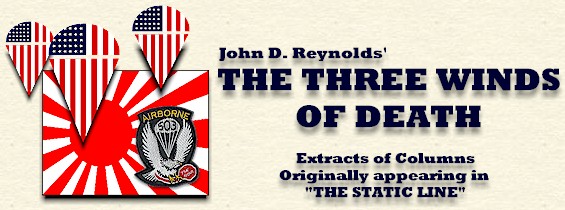|

MOON OVER AUSTRALIA
(THE GREAT AUSTRALIAN TRAIN RIDE)
By Don Herold
It was early October 1943. We had just docked in
Brisbane, Australia, after a fast 13-day cruise from San Francisco.
We were 375 replacements for the 503rd Prch. lnf. Reg.
The 503rd had
just completed a combat jump in the
Markham
Valley near Lae, New Guinea. We
were
replacements
for that operation. Most of us were in our late teens or early twenties. We
had just completed basic training and jump school. We were ready to do battle
with all comers. What we weren't ready for was a 4-day, 3-night ride up the
coast of sunny Australia.
Once we disembarked from the "Lurline", we
were trucked to Camp Ascot. This was a racetrack
in
Brisbane
that had been pressed into service as a staging area for incoming U.S.
soldiers. We remained there for two or three days before boarding a train that
would take us 1,000 miles north to the base camp of the 503rd; The camp was
south of Cairns, near a small village called Gordonvale.
Troop
trains were familiar to all of us since we had logged thousands of miles
crisscrossing the United States. However, this troop train was different.
There were no padded seats, no pull down beds, no mess car. The train we
boarded looked somewhat like a train you would see in a 1934 Randolph Scott
western. It was the narrow gauge, open air variety. There were two wrought
iron seats closely packed behind one another on each side of a narrow aisle.
Each car had a small room at the front end. The room had a sink in one
corner that ran running water from a bottle above. The small room also
contained what passed for a toilet in another corner.
No running water, mind you, just a seat ,over a hole in the floor.
It served the purpose provided the train wasn't standing in a Station.
Top speed was 25 to 30 MPH.
The
trip started out uneventful but quickly became uncomfortable. Soot and cinders
from the engine blew back into the cars and covered everyone. We were wearing
khaki uniforms that quickly became black with
grime.
Seeping was done sitting in the chairs, wrapping yourself around the base of
the chairs, or stretching out in the narrow aisle if
you
could find space.
Our food quickly
became the main concern. We would
stop two or three times a day at a
small village and traverse
a soup line set up next to the
railroad by local Australians. The food was highly greasy and none too tasty.
Sanitation conditions were
primitive, to say the least. One big can of warm water was usually provided to
wash our mess kits. Cleanliness was sadly lacking.
The result of these conditions is easy to predict.
I
guess it was about midnight the second night that I awoke with a rumble in my
abdomen. I doubled over with an urgency that could not be denied or contained.
I headed for the little room - but too late - the whole car was awake and in
the same dire straits. The next
best place was the platform at the end of the car -
it
too
was packed. All that remained were the windows that provided any type of
opening at all. Any port in a storm. Needless to say, the "moon over
Australia" that night was full and complete. The party went on for quite
a while.
I had my share of dysentery, and diarrhoea during the
next 27 months of overseas duty, but it was nothing to compare with the
compelling urgency of that night.
It was a ragtag looking bunch that disembarked at
Gordonvale. A shower, shave, and clean clothes were necessary for a return to
the living. (As I read this letter while I am typing the column, the thought
came to mind if both sides of the train were mooned or did anyone worry about
which direction the wind was blowing from.)
READ ON.../2
|

